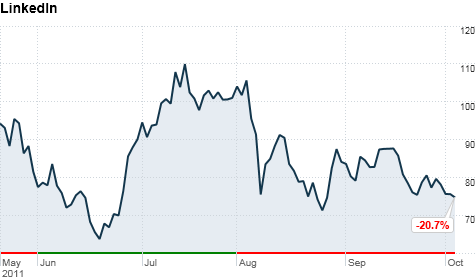Search News

LinkedIn's shares more than doubled in its May IPO. Shares are still trading well above its IPO price, but have struggled along with the broader stock market.
NEW YORK (CNNMoney) -- Stephan Paternot, founder and general partner of the Actarus Funds, was co-founder and co-CEO of theglobe.com. He authored "A Very Public Offering," which chronicled his experience creating the Internet's first social networking site.
Ongoing instability and uncertainty in the stock market has delayed nearly 200 public offerings so far this year, including several high-profile IPOs by tech companies like Zynga and Groupon.
 |
| Stephan Paternot is former co-CEO of theglobe.com. He is now an investor. For more about him, click on the photo. |
However, for those handful of large players and the legions of smaller companies desperately eyeing an IPO further down the line, an alternative has arisen to meet their capital and liquidity needs.
With Internet-based crowd-funding and secondary market platforms making strides, the question becomes not when you should go public, but why go public at all.
Having set stock market history when I took my company, theglobe.com, public with the highest rising IPO of all time, only to lose it all just two years later, I am still haunted by what could have been if today's alternatives had existed back then.
Back in 1998, and still true until recently, an IPO was the only event in a company's lifespan that could provide not only the scale necessary for large capital infusions, but more importantly, liquidity for shareholders.
Don't get me wrong, going public can be great. It's exciting, it gives you credibility with investors, premium visibility in the media, and, like winning a best picture Oscar, it's prestigious.
In the 90s, after theglobe.com's record-shattering IPO, everyone wanted their shot at going public. It became "IPO mania." We were called 24-year old "whiz kids" and became the toast of Wall Street, but with too many investors and speculators piling into hyper inflated stocks, our story ended a couple of years later the only way it could -- in disaster for just about everyone.
Looking back more than a decade at the first Internet bubble, part of the problem was, no doubt, due to too many pioneering startups coming to market with not enough revenue to go around.
However, unlike prior gold rushes, the investor demand was greatly amplified by a system which incentivized every firm to go public too soon, putting your company at the mercy of a market that doesn't necessarily know how to value your long-term objectives or your short-term tactical decisions, such as forgoing short-term profits because the competitive field suddenly shifts and you need to push resources to innovate or die.
Even though dotcoms nowadays have much more robust bottom lines, these market dynamics still apply. Just ask Netflix's (NFLX) Reed Hastings. But what are companies to do that don't want to go public, yet still need additional capital or liquidity?
With volatile markets scaring off investors, banks holding onto their cash and government stimulus money drying up, a paradigm shift has begun. An entire new Internet-based financial eco-system of "crowd-funding" and "secondary markets" has emerged in the last few years that is less-costly to access and more efficient, flexible and scalable.
It allows for both big and small players to invest in, and in many cases, trade out of, companies seamlessly. These marketplaces represent a new economic model that quickly and efficiently directs capital into the best and brightest ideas. They often leverage online social networks to aggregate donors and investors in support of a cause or project.
Until recently, connecting great entrepreneurs and ideas with lots of investors was very time consuming and inefficient. Unless you were lucky enough to meet a billionaire along the way, most entrepreneurs expended far too much energy searching for investors (and vice versa), when they should have been focused on hiring great talent and building a fantastic business.
For small scale businesses, experimental projects, or social causes, crowd-funding facilitators such as Indiegogo and Kickstarter are providing the tools to raise donations in exchange for perks straight from your social network.
On a larger scale, LendingClub and Prosper have made it easy for tens of thousands of accredited investors to lend tens of millions of dollars each month to small borrowers, side stepping banks entirely and passing the savings along to both parties.
There's also AngelList, which has enabled early and mid-stage tech startups to efficiently connect with accredited angel investors worldwide, and in the process bypass the traditional Silicon Valley venture capital firms and their aggressive valuation discounts.
However, until recently, even if you were lucky enough to find the right investors, it was extremely risky for them to invest in your startup, as there was little chance of them obtaining liquidity for at least five to ten years.
Often, the only exits were finding a larger company to buy yours for cash, or jumping through all the hurdles required to go public.
Today, medium and large companies have options like SecondMarket and Sharespost, which make it much easier for investors and founders to sell their otherwise illiquid shares to other accredited investors, without ever having to go public. That allows them to take some of their risk capital off the table, and perhaps re-invest it in new startups, thus continuing the cycle of life.
The best news is that crowd-funding platforms are already pumping hundreds of millions in capital each year into startups around the world, that are in turn hiring hundreds of thousands of new employees. Countless successful companies, like Facebook, have been able to hold off from going public in part thanks to alternatives like SecondMarket.
I believe in these new marketplaces so much so that I've put my money where my mouth is and just made an investment in SecondMarket, as well as several of the other companies listed above.
And as long as the government doesn't get in the way by over regulating, we might just have the birth of a new, grass-roots engine to power the growth of small and medium-sized firms, and the beginning of a Wall Street-independent America. ![]()
| Index | Last | Change | % Change |
|---|---|---|---|
| Dow | 32,627.97 | -234.33 | -0.71% |
| Nasdaq | 13,215.24 | 99.07 | 0.76% |
| S&P 500 | 3,913.10 | -2.36 | -0.06% |
| Treasuries | 1.73 | 0.00 | 0.12% |
| Company | Price | Change | % Change |
|---|---|---|---|
| Ford Motor Co | 8.29 | 0.05 | 0.61% |
| Advanced Micro Devic... | 54.59 | 0.70 | 1.30% |
| Cisco Systems Inc | 47.49 | -2.44 | -4.89% |
| General Electric Co | 13.00 | -0.16 | -1.22% |
| Kraft Heinz Co | 27.84 | -2.20 | -7.32% |
| Overnight Avg Rate | Latest | Change | Last Week |
|---|---|---|---|
| 30 yr fixed | 3.80% | 3.88% | |
| 15 yr fixed | 3.20% | 3.23% | |
| 5/1 ARM | 3.84% | 3.88% | |
| 30 yr refi | 3.82% | 3.93% | |
| 15 yr refi | 3.20% | 3.23% |
Today's featured rates: